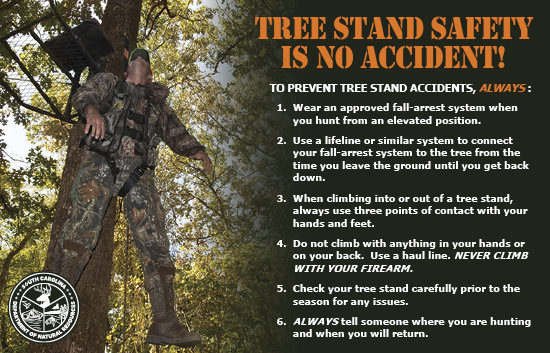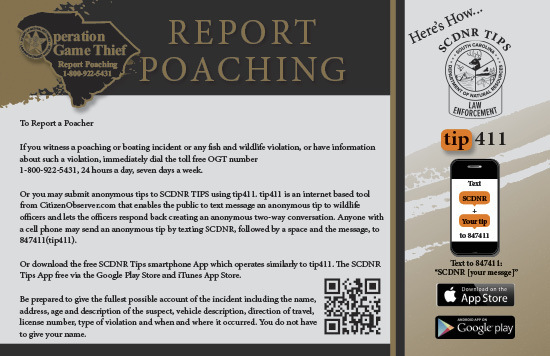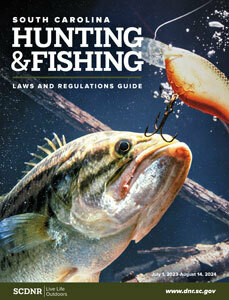General Rules & Regulations
General Information on Hunting
“Hunting” means the act of trying to find, seek, obtain, pursue or diligently search for wildlife with the means and intent to take or attempt to take such wildlife.
Regulations in this section apply to both private and public lands statewide, unless otherwise specified.
Licenses & Permits
Licenses and permits are required for hunting in South Carolina. Detailed information on types of licenses and permits is located on Licenses Recreational Hunting & Fishing. All residents and nonresidents born after June 30, 1979 must successfully complete a hunter education course that is approved by SCDNR before a hunting license can be obtained. For exceptions, see Licenses Recreational Hunting & Fishing.
Game Zones & WMAs
South Carolina is divided into four game zones, as defined on the maps in Deer Seasons on Private Lands.
SCDNR sets and regulates the methods of harvest, bag limits and other requirements for hunting on Wildlife Management Areas (WMA) statewide.
The SC General Assembly establishes seasons, limits and methods for private land statewide. SCDNR is responsible for law enforcement statewide.
Protected Game
The following species may be hunted ONLY during legally established seasons: bear, beaver, bobcat, deer, fox, mink, muskrat, opossum, otter, rabbit, raccoon, skunk, squirrel, weasel, waterfowl (goose, brant and duck), bobwhite quail, mourning dove, rails (marsh hen), coot, gallinule, ruffed grouse, crow, wild turkey, common snipe and woodcock.
Protected Nongame
The following species are protected and may not be hunted, molested, caught, transported, sold or possessed in any manner without a permit: any species appearing on the state list of non-game and endangered species (R 123-150), birds of prey (eagles, hawks, osprey, owls, kites, and vultures) and non-game birds (except English sparrows, pigeons, Eurasian collard doves and starlings). Falconers must possess a SCDNR permit.
Importation & Possession
It is unlawful to import, possess or transport for the purpose of release, or to introduce or bring into this state any live wildlife of the following types without a permit from SCDNR: a member of the family Cervidae (deer, moose, elk, etc.), bear, turkey, furbearers (this includes badger, beaver, bobcat, Canada lynx, coyote, fisher, any foxes, marten, mink, muskrat, nutria, opossum, any otter, raccoon, ringtail, any skunk, weasels, or wolves), a nondomestic member of the families Suidae or Tayassuidae (pigs), or Bovidae (bison, antelope, mountain goat, mountain sheep) (50-16-20). The importation or possession of live alligators is illegal without a permit from the Department (50-15-390).
The importation or sale of live wolves is prohibited in South Carolina, except for exhibition or scientific purposes upon the approval of SCDNR as provided by regulations (50-11-1765). It is unlawful to import coyotes. The possession and sale of live foxes and coyotes is restricted by law (50-11-2630). A person may not have a live wolf in his possession without a SCDNR permit. Federal law prohibits importing, exporting, selling, buying, receiving or acquiring big cats across state lines. For information and exceptions, contact the US Fish and Wildlife Service Southeast Region, 1875 Century Blvd., Atlanta, GA 30345. Prohibition of Sale, Purchase, Donation, or Transfer of Ownership Wildlife as Pets - The Department of Health and Environmental Control’s (DHEC) Rabies Control Act (47-5-50) prohibits the sale, purchase, donation, or transfer of ownership of nondomesticated carnivores (raccoons, foxes, skunks, bobcats, coyotes, wolves, wolf dogs, weasels, civet cats, spotted skunks, and lynx or the offspring born to any combinations of crossbreeding (hybrids) between these wild animals and domestic dogs or cats) to private individuals in this State. Requests for importing furbearing animals for private possession violate the spirit of the Rabies Control Act and will be denied.
Note: SCDNR does not advocate or encourage keeping wildlife in captivity.
Equipment & Methods
Archery
Archery means a longbow, recurve bow, compound bow or crossbow (50-11-565). There are no restrictions on draw weight/length, arrow weight/length, or broad head weight, width, or style.
Crossbows
Crossbows may be used on private lands and WMA lands statewide during all archery, muzzleloader or gun seasons for deer, bear and turkey.
Primitive Weapons
For special primitive weapons seasons, primitive weapons include bow and arrow, crossbows and muzzleloading shotguns of twenty gauge or larger, and rifles of .36 caliber or larger with open or peep sights or scopes, which use black powder or a black powder substitute that does not contain nitrocellulose or nitro-glycerin components as the propellant charge. There are no restrictions on ignition systems including flintstone, percussion cap, shotgun primer, disk, or electronic. During primitive weapons season, no revolving rifles are permitted (50-11-310). Falconry Allowed.
Pneumatic Weapons
Pneumatic weapons including those that shoot arrows may be used on private and WMA Lands statewide during firearms seasons only. On WMAs restrictions found in WMA Regulation 3.1 and 3.3 apply to pneumatic weapons.
Transporting Firearms
There are no SCDNR restrictions on transporting firearms by licensed hunters and fishermen in a vehicle to and from the place of hunting and fishing except on WMA lands. For regulations on WMA lands see Weapons 3.4 in WMA Regulations.
Calls, Recorded or Electronically Amplified
It is illegal to hunt, catch, take, kill or attempt to hunt, catch, take or kill any game bird or game animal with the aid of recorded calls or sounds or recorded or electronically amplified imitations of calls or sounds (50-11-40). Crows, coyotes or hogs are not game birds/animals and therefore can be hunted using electronic calls on private lands and WMA lands.
Youth Hunting Days
Youth Hunting Days are scheduled for many species of game and are for youth 17 years of age and younger. Youth who have not completed the hunter education program must be accompanied by an adult at least 21 years of age. Only the youth may take or attempt to take game. License and tag requirements are waived for the youth hunter only on youth days outside of the normal hunting season. (50-9-740)
Free Hunting Days - January 13 & 14 on Private Lands and January 13 on WMA lands.
This special opportunity IS ONLY VALID FOR RESIDENTS OF SC THAT DO NOT HAVE A CURRENT STATE HUNTING LICENSE. On these days, those individuals are permitted to hunt without a state hunting license or other required permits, to include Wildlife Management Area (WMA) permit, or Migratory Waterfowl Permit (formerly State Duck Stamp) on all lands in which hunting is allowed, including private lands & Wildlife Management Areas (WMAs) that are not otherwise closed to hunting. Many WMAs may be closed to waterfowl hunting or other types of hunting or have special restrictions. Refer to info beginning on pg. 94 for specific WMAs. All existing seasons, bag limits & methods of take still apply.
Free Hunting Days are offered by the State of South Carolina and do not waive any Federal requirements for a Federal Migratory Bird Hunting and Conservation Stamp (Federal Duck Stamp) to hunt migratory waterfowl.
Prohibited Acts
Shining
In all game zones, the use of artificial lights for the purpose of observing or harassing wildlife is unlawful, except that a property owner, lessee, or person with written permission from the property owner may use artificial lights to observe wildlife prior to 11:00 PM. This section does not prohibit an owner of real property from using artificial lights for the purpose of protecting the property. This section does not prohibit the use of remote trail monitors or cameras from fixed locations on a property, nor does it prohibit a person or group, with written permission of the landowner or leaseholder of the property, from observing wildlife with the use of artificial lights who is engaged in research or documentary filming (50-11-717). This section does not prohibit a person from lawfully hunting coyotes, armadillos, and hogs at night as provided for by law (See Feral Hog, Coyote & Armadillo Regulations).
Sunday Hunting
Hunting is prohibited on Sundays on all WMA lands unless otherwise specified. On private lands statewide, Sunday hunting for all game is legal.
Selling Game Animals
It is unlawful to sell, except by special permit, any protected wildlife (50-1-290). Furbearing animals may be sold with a valid commercial fur harvest license. See Trapping & Commercial Fur Harvesting for more information.
Trespass
It shall be unlawful to enter upon the lands of another for the purpose of hunting, fishing, trapping or retrieval of dogs without the consent of the landowner or manager.
Hunting from Public Roads
It is unlawful to hunt from a public road unless the hunter has permission to hunt the adjacent property. Hunting as used in this section includes possessing, carrying or having readily accessible a loaded centerfire rifle, or a shotgun loaded with shot size larger than number four. Loaded means a weapon within which any ammunition is contained. This does not include weapons contained in a closed compartment, closed vehicle trunk, or a vehicle traveling on a public road. A person convicted of unlawful road hunting forfeits hunting privileges for one year. See WMA Regulation 3.6 in WMA Regulations for restrictions on WMA lands.
Negligent Hunting
It is unlawful to use a firearm or archery tackle in a criminally negligent manner while in preparation for, engaged in the act of, or returning from hunting. Criminal negligence is defined as the reckless disregard for the safety of others.
Night
Night is defined as that period of time between one hour after official sunset of a day and one hour before official sunrise of the following day (50-11-710).
Night Hunting
Night hunting is unlawful except that raccoons, opossums, foxes, mink, skunk, coyotes, armadillos and hogs may be hunted at night. Information related to hunting coyotes, armadillos and feral hogs during night is provided in Feral Hog, Coyote & Armadillo Regulations under specific headings for these animals.
Raccoons, opossums, foxes, mink, and skunk may not be hunted with artificial lights except when treed or cornered with dogs. Devices that amplify light using some type of power source (including night vision and infrared devices) are considered artificial light. No buckshot or any shot larger than a No. 4, or any ammunition larger than .22 rimfire may be used. It is unlawful to use artificial lights at night, except vehicle headlights while traveling in a normal manner on a public road or highway, while in possession of or with immediate access to, both ammunition of a type prohibited for use at night and a firearm capable of firing the ammunition (50-11-710).Rabbit hunting at night without weapons is lawful on private land.



